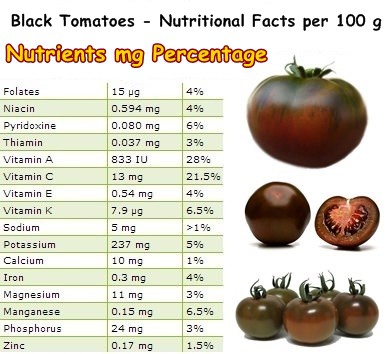Over the past few years tomatoes have stolen the spotlight and few other foods have enjoyed so much controversy as they have.
First, it was all about whether tomatoes were truly fruits or whether they could still hold their well-deserved place among the veggies. At present, the craze of the black tomatoes has managed to lay a hold of everyone.
Are black tomatoes healthier? Are they more easily available? Why are they black? Are they genetically manipulated? Are they safe to eat? The answer is black tomatoes are just as healthy as regular ones, even healthier in terms of their antioxidant value and the health benefits that with it.

Black tomatoes are rich in antioxidants called anthocyanins which are also the source of important health benefits. Other than this, they boast a similar nutritional profile to red tomatoes. On average, nutrition facts for 100 g of include:
- 18 kcal (kilocalories, calories)
- 0.9 grams of protein
- 0.20 grams of fat
- 3.9 grams of carbohydrates
- 2.6 grams of sugar, or less
- 1.2 grams of dietary fiber found in the highest concentration in the skin and seeds.
Black tomatoes are richest in vitamin C (13 milligrams) and vitamin A (833 international units) and provide small amounts of several B group vitamins, vitamin K and dietary minerals, notably the antioxidant mineral manganese and the electrolyte potassium which regulates blood pressure numbers.
What are black tomatoes more exactly?
Black tomatoes come from regular tomatoes that were especially bred, aka genetically engineered, so that their outer skin turns a very dark purple-black or blue-black color when ripe, while the pulp a dark red, purple-red or purple-black color.
Although the fruit starts out green like all other tomato varieties, as it ripens it gets darker and darker. Depending on how deep the pigment of the outer skin is, the fruits may be called black tomatoes, purple tomatoes or blue tomatoes.
Other denominations for this particular variety of tomatoes include: ‘Indigo Rose’ or ‘Sunblack’.
Find out more about what are black tomatoes.
Where do black tomatoes come from?
Black tomatoes can be obtained either through cross breeding or genetic manipulation. What is the difference between conventional breeding and genetic manipulation? Conventional breeding naturally changes some of the characteristics of the common tomato by crossing it with other closely related varieties that poses one or more desired characteristics. This is done until the resulting fruit achieves the desired characteristics. In this case, it would mean somebody would have to cross dark-colored tomatoes until they get a plant with the darkest possible pigment.
Genetic manipulation involves manipulating the genome of the plant by incorporating actual genes from other plants, related or not. Genetically modified black tomatoes have a rather uniform purple-blackish color, while the conventionally bred varieties may have a less intense color, owing to the fact that purple or black tomatoes don’t occur naturally and the most you can get by crossing different varieties with somewhat of a darker color is a darker red-purple fruit, not quite black.

What makes tomatoes black?
Why are black tomatoes black instead of red or another color? This dark pigment has to do with an increased level of anthocyanins, natural red, blue and purple pigments with potent antioxidant effects.
These pigments enjoy a wide occurrence in nature and can be found in cranberries, red raspberries, blueberries, blackberries, eggplants, grapes, plums, purple-violet flowers and black or blue tomatoes.
So basically, black tomatoes are regular tomatoes with more anthocyanins.
By comparison, red tomatoes get their color from a red antioxidant pigment called lycopene. But in order for lycopene to produce beneficial effects, it needs to be activated by cooking the tomatoes.
Black carrots (or purple carrots) are also a rich source of the antioxidant pigment (also see the benefits of black carrots).
Nutrition facts and benefits Black Tomatoes
Because of their purplish or black skin color, black tomatoes have a much higher anthocyanin content. Anthocyanins are strong pigments with antioxidant properties whose purpose is to protect plants from ultraviolet radiation from the sun.
A diet consisting of foods rich in these pigments is believed to bestow the same antioxidant effects on us and reduce damage produced by harmful reactive oxygen molecules called free radicals.
Free radicals are highly reactive agents whose activity damages cells, causes extensive inflammation and ultimately leads to the onset of various forms of chronic disease, from degenerative nervous system diseases to cardiovascular disease or cancer.
A regular intake of black tomatoes and other anthocyanin-rich foods has been found to offer protection against coronary heart disease. Aside from this, what makes black tomatoes healthy is their varied nutritional profile, consisting of small and moderate amounts of several essential vitamins and minerals.

For example, because they provide an estimate of 28% of the recommended daily intake of vitamin A, black tomatoes are good for eyesight, promoting visual acuity and protecting the retina from free radical damage from sunlight.
Vitamin A is also essential for healthy mucous membranes and stimulates immunity.
The fruits further provide 13 milligrams of vitamin C for every 100 grams, adding to the antioxidant benefits and anti-inflammatory action. Vitamin C is possibly the most potent natural antioxidant and anti-inflammatory.
Not only does it reduce inflammation in the body, which is the cause for many debilitating illnesses, but it also strengthens the immune system’s response to infection and disease.
Black tomatoes are a good food to consider for arthritis as a result of their anti-inflammatory action.
Moreover, the fruit provides small amounts of manganese (0.15 milligrams) and potassium (237 milligrams). Manganese is an antioxidant-mineral, while potassium regulates blood pressure and prevents water retention and leg swelling.
The fruit is also a source of thiamine, niacin, pyridoxine and folic acid as well as carbohydrates and natural sugars, providing benefits for energy metabolism. Small amounts of iron, magnesium, phosphorus and zinc contribute to a tonic effect.
The fruit provides around 1.2 grams of dietary fiber for every 100 grams and 2.2 grams of fiber per cup (180 grams of tomato in a cup), contributing to better digestion and improved transit time, with benefits for constipation and hemorrhoids. Lastly, with almost 95% water content, black tomatoes are a good food to consider in hot weather because they counteract dehydration.
Conclusion
Keeping with the tradition, black tomatoes are just as fresh, though not always as sweet as regular tomatoes, making them a preferred choice for summer salads or sandwiches. If you are concerned about them being genetically modified, you can opt for the varieties of black tomatoes that have been conventionally bred and do not exhibit the uniform purple-black color throughout. Moreover, you can purchase black tomato seeds and plant your own fruit. This will not only provide you with peace of mind knowing you are growing your food right, but it will also allow you to enjoy a truly healthy, natural, organically-grown fruit. Your health is your choice.
